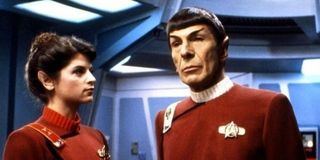The Story Behind How Star Trek Created Klingon And Vulcan Is Great

Star Trek went the extra mile in creating some of its alien languages like Klingon and Vulcan, giving them real form and grammar rather than simply creating gibberish. However, while the final product of these languages feels methodically crafted, it turns out the beginning of the process was far less planned and much more hilarious. Marc Okrand, the linguist who created both Klingon and Vulcan says he was first offered the job to create the Vulcan language in Star Trek II: The Wrath of Kahn, and he actually was asked to create gibberish. Specifically, gibberish that would match the lip movements of the same words, that had already been spoken on the set in English. According to Okrand...
My real job, the one that really paid the bills, was closed captioning. The first program we did live was the Oscars, 1982. They flew me out to L.A., and I was having lunch with a friend who worked at Paramount. She and I go out to lunch, and the fact that I was a linguist came up --- I have a PhD in linguistics. She said: 'That's really interesting. We've been talking to linguists. There's this scene in the movie where Mr. Spock and this female Vulcan character have a conversation. When they filmed it, the actors were speaking English. But in post- production, everyone thinks it would be better if they were speaking Vulcan.' They wanted a linguist to come and make up gobbledygook that matches the lip movements. And I said, 'I can do that!'
It's actually pretty funny that the beginning of the process that led to the creation of alien languages so well designed that you can actually study and learn them yourself began within the constraints of only being able to create sounds that matched preexisting lip movements.
Apparently, Paramount liked Marc Okrand's work inventing these few words of Vulcan so much in Star Trek II that he tells the Washington Post that when the time came that they needed somebody to create words of Klingon for Star Trek III: The Search for Spock, they again called on the linguist. Klingon had actually already been spoken briefly, in the opening of Star Trek: The Motion Picture. In order to keep continuity with the first film, Okrand listened to the language used in that film and simply built on that, making sure the language sounded alien by combining sounds from different languages that didn't sound like they belonged together.
You listen to the lines in the first movie. That'll tell you what the sounds are. I added to it. These are not human; their language should not be recognizably human. But the people who are going to speak it, the actors, are human. So I added no sounds that you can't find in some human language or other, but you shouldn't find these sounds in the same language. It's unnatural. At the time I didn't know it was going to, you know, live long and prosper.
Live long and prosper, it did, however. Decades later the Star Trek franchise is still going strong and the languages created by Marc Okrand are still being used. We'll almost certainly hear them in the next Star Trek movie, whichever one that turns out to be.
CINEMABLEND NEWSLETTER
Your Daily Blend of Entertainment News

CinemaBlend’s resident theme park junkie and amateur Disney historian, Dirk began writing for CinemaBlend as a freelancer in 2015 before joining the site full-time in 2018. He has previously held positions as a Staff Writer and Games Editor, but has more recently transformed his true passion into his job as the head of the site's Theme Park section. He has previously done freelance work for various gaming and technology sites. Prior to starting his second career as a writer he worked for 12 years in sales for various companies within the consumer electronics industry. He has a degree in political science from the University of California, Davis. Is an armchair Imagineer, Epcot Stan, Future Club 33 Member.
Most Popular


